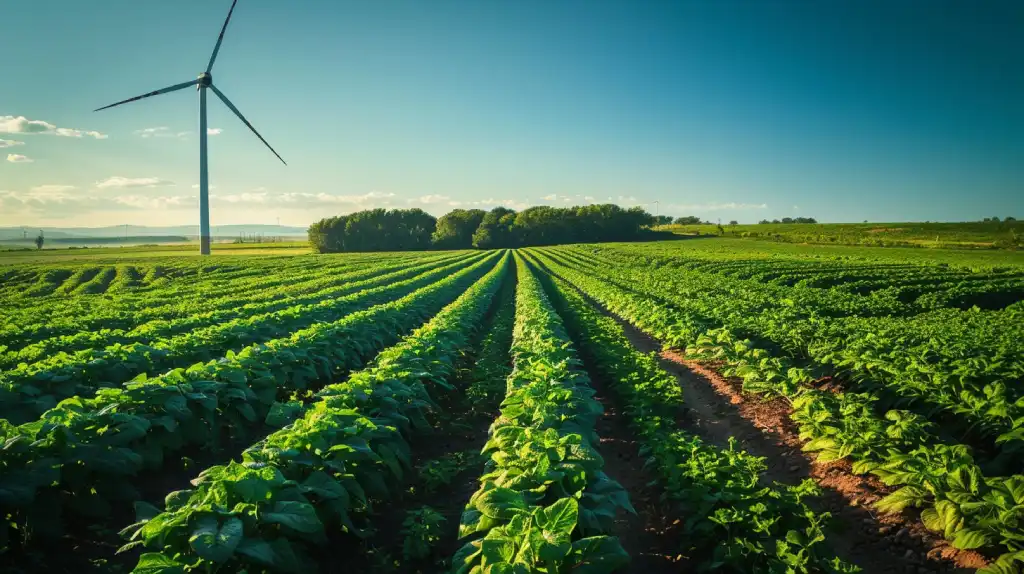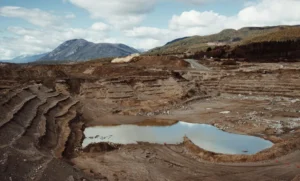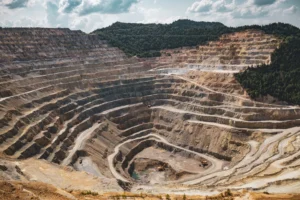Sustainable agriculture is important for human survival as it secures a dependable food source for a growing population while preserving our natural resources.
By nurturing the land through practices like crop rotation and soil enrichment, sustainable agriculture preserves the environment.
Sustainable agriculture is more crucial than ever. Did you know that by 2050, the world will need to produce 70% more food to feed a projected 9.8 billion people.
Current farming methods contribute to 24% of global greenhouse gas emissions.
Shockingly, about 33% of the world’s soil is already degraded, making sustainable practices essential to secure our planet’s future.
Sustainable agriculture is farming methods that protect the environment, public health, and animal welfare. These methods aim to produce food in a way that doesn’t harm natural resources, so future generations can also meet their food needs.
Understanding sustainable agriculture is vital for making informed choices about food production and consumption. It helps us realize the impact of our actions on the environment and inspires us to support practices that benefit the planet and society.
What is Sustainable Agriculture?
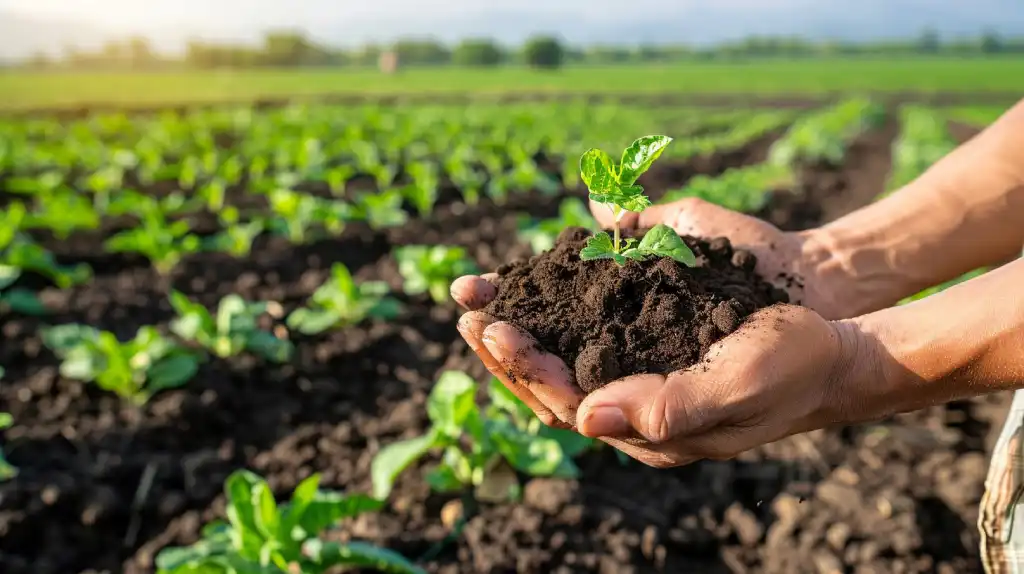
Sustainable agriculture is a farming approach that prefer long-term health of the land, people, and environment.
It focuses on producing food and fiber while conserving resources, reducing environmental impact, and securing the well-being of farmers and communities.
It balances the need for food production with the preservation of natural resources and environmental quality.
Key principles and practices
Crop Rotation
Changing the types of crops grown in a specific field each season to improve soil health and reduce pests. This practice helps prevent soil loss and interrupts pest and disease cycles, making it a fundamental principle of sustainable farming.
Agroforestry
Combining trees and shrubs with crops and livestock systems to boost biodiversity and reduce soil erosion. Agroforestry creates a diverse ecosystem that supports wildlife, improves soil health, and offers extra income sources for farmers.
Integrated Pest Management (IPM)
Using natural predators and limited chemical inputs to manage pests. IPM reduces reliance on harmful pesticides, promoting a healthier environment and reducing costs associated with pest control.
Soil Management
Techniques like cover cropping and reduced tillage to maintain soil fertility and structure. These methods improve soil organic matter, improve water retention, and reduce erosion, securing long-term soil productivity.
Water Conservation
Efficient use of water through drip irrigation and rainwater harvesting. These practices help to optimize water use, reduce waste, and make sure that crops receive the necessary moisture without decreasing or polluting water resources.
Why is Sustainable Agriculture So Important
Sustainable agriculture is important to secure food supply for a growing population while protecting our environment.
It conserves natural resources, improves soil health, reduces pollution and builds strong farming systems. By promoting biodiversity and supporting rural communities, sustainable agriculture secures a healthy environment for all.
Sustainable agriculture is important for securing long term food security, environmental health, and economic success.
Conventional farming practices have reduced natural resources, contributed to climate change, and degraded soil fertility.
By contrast, sustainable agriculture seeks to lessen these issues through practices that preserve ecosystems, improves precious biodiversity, and support rural communities.
Importance of Sustainable Agriculture
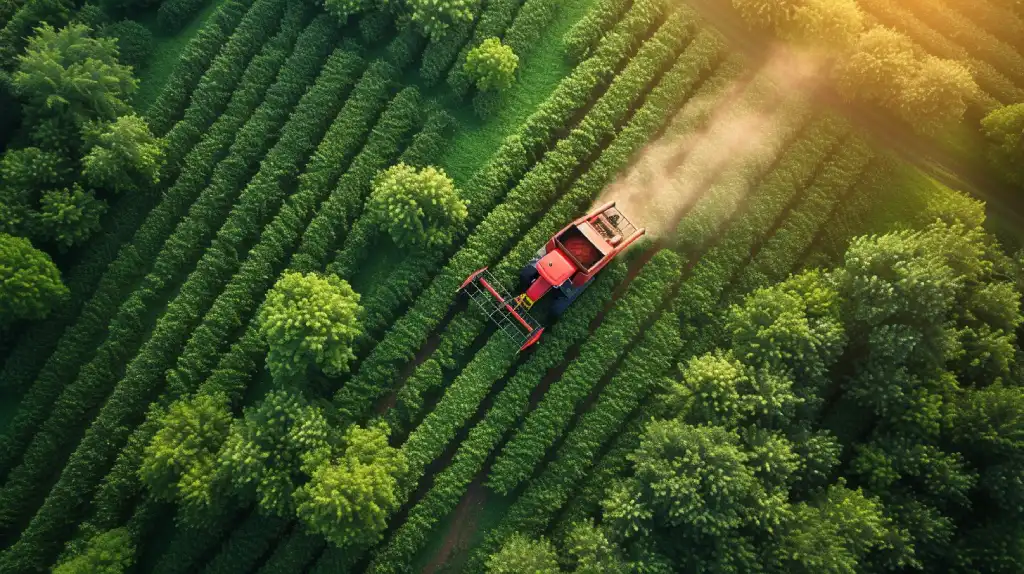
Sustainable Agriculture offers a wide range of advantages. Environmentally, it reduces greenhouse gas emissions, conserves water, protects soil health, and reduces pollution.
Economically, it can increase farm profitability through reduced input costs and premium market prices for sustainably produced goods.
Socially, it promotes rural development, improves food safety, and strengthens public health.
Essentially, sustainable agriculture is a balanced approach to food production that prefer the well-being of both people and planet.
Soil health
Practices like crop rotation and reduced tillage maintain soil structure and fertility, preventing erosion and degradation. Healthy soil is very important for plant growth and ecosystem stability.
Water conservation
Efficient water use practices make sure that water resources are not declined, preserving them for future use. Methods like drip irrigation reduce water waste and increase crop yields.
Biodiversity
Combining different crops and trees supports a variety of species, promoting a healthy ecosystem. Biodiversity assures resilience against pests and diseases and supports ecological balance.
Economic benefits
Cost savings
Sustainable methods often reduce the need for expensive chemical inputs and improve efficiency. Lower input costs mean higher profit margins for farmers.
Long-term productivity
Healthy soils and ecosystems lead to more consistent and reliable crop yields over time. Sustainable practices make sure that land remains productive for future generations.
Social benefits
Community health
Reduced chemical use means fewer pollutants in food and water, leading to healthier communities. Healthier communities result in lower healthcare costs and improved quality of life.
Food security
Sustainable practices assure a stable food supply by preserving the resources needed for future food production. A stable food supply supports community resilience and reduces the risk of food shortages.
Implementation and Proven Results
- In India, smallholder farmers adopting sustainable practices have seen improved yields and soil health. These practices have led to increased food security and economic stability for their communities.
- Organic farms in the United States are successfully using crop rotation and composting to improve soil fertility and reduce pests without synthetic chemicals. These farms serve as models for sustainable farming and have shown significant long-term benefits.
Challenges and Solutions
Common challenges
Economic barriers
Initial costs of evolving to sustainable practices can be high. Farmers may need financial support to adopt new technologies and practices.
Knowledge gaps
Farmers may lack information or training on sustainable methods. Education and extension services are essential to bridge these gaps.
Market access
Limited access to markets for sustainably produced goods. Farmers need better market opportunities to sell their products at fair prices.
Innovative solutions and practices
Financial incentives
Governments and organizations can provide grants or subsidies to support the change. Financial support can help offset the initial costs of adopting sustainable practices.
Education and training
Extension services and educational programs can help farmers learn about sustainable practices. Providing knowledge and skills is crucial for successful implementation.
Market development
Creating demand for sustainably produced goods through certification and consumer awareness campaigns. Certification schemes and awareness campaigns can drive consumer preference for sustainable products, improving market access.
The Future of Farming - A Dual Approach
E-Farming
E-farming uses sustainable technology to transform agricultural practices. Through advanced data analysis, precision farming, and automation, it improves resource management, increases productivity, and lowers environmental impact.
By collecting and analyzing data on soil conditions, weather patterns, and crop health, farmers can make informed decisions, reducing waste and increasing yields.
Regenerative Agriculture
Regenerative agriculture focuses on restoring and improving ecosystem health. By using practices like crop rotation, cover cropping, and reduced tillage, farmers build soil organic matter, improve water infiltration, and increase biodiversity.
This combined approach boosts agricultural productivity, sustainability and also captures carbon, reduces climate change, and boosts overall ecosystem resilience.
The Bottom Line
Why is sustainable agriculture so important
Sustainable agriculture is important for a healthy planet and environment.
It protects the environment, conserves resources, and supports thriving communities while securing a stable food supply.
So, Why is Sustainable agriculture so important is for a way of farming that meets our current needs without harming the environment or wasting resources for future generations. It offers environmental, economic, and social benefits and is crucial for securing a stable food supply.
Adopting sustainable agriculture practices
Everyone can support sustainable agriculture by choosing sustainably produced foods, supporting for policies that promote sustainable farming, and educating others about its importance.
FAQ's
1. What is the meaning of sustainable agriculture?
Sustainable agriculture is farming in a way that helps the Earth and future generations. It means growing food without hurting the environment, saving water, and taking care of the soil.
2. Why is sustainable agriculture so important?
Sustainable agriculture nourishes people, land and the environment.
3. Why is sustainable agriculture important in today's world?
Sustainable agriculture is important because it helps feed the world while protecting our planet. It saves water, reduces pollution, and keeps our soil healthy.
4. Why is agriculture so important to the sustainable development goals?
Agriculture is super important for reaching the SDGs. It helps us feed everyone, protect the environment, and lift people out of poverty. By growing food in a healthy way, we can save water, protect our soil, and make sure farmers have good jobs.
